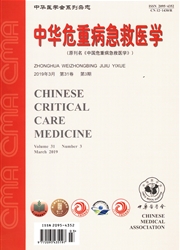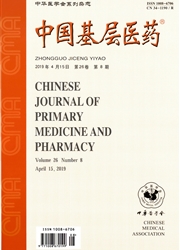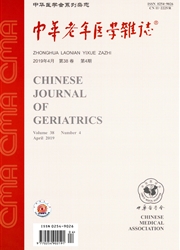无创脑水肿动态监测技术在颅脑损伤急危重症救治中的应用
摘要脑水肿可继发于多种原因导致的颅脑损伤,严重者可发生脑疝或死亡。精准实时监测脑水肿变化、合理应用脱水药物、及时处理脑水肿情况对改善患者预后极为重要。然而,目前临床上常用的监测手段均存在不同程度的缺陷。无创脑水肿动态监测技术是一种新兴的监测手段,可通过电磁扰动等技术使脑水肿程度得以量化,直观反映颅脑深部组织的水肿状态。本文就无创脑水肿动态监测技术在颅脑损伤急危重症患者救治工作中的应用情况进行综述,以期为临床脑水肿监测提供参考。
基于肠-肾轴的脓毒症相关性急性肾损伤的研究进展
摘要脓毒症相关性急性肾损伤(SA-AKI)作为脓毒症常见的肾脏功能障碍,其发病率和病死率日益增加,已成为威胁人类健康的主要疾病之一。基于"肠-肾轴"理论,肠道和肾脏在脓毒症中具有双向协同的关系,肠道菌群失调、内源性代谢物失调和内皮屏障完整性受损等参与了肾脏损伤的过程,肾脏炎症介质水平的升高又干扰了肠道微生物的构成。因此,了解SA-AKI中肠-肾串扰的机制,有助于为制定新的SA-AKI治疗策略提供潜在依据。
一种中心静脉压测量工具设计与应用
摘要中心静脉压(CVP)可反映患者的有效血容量、心功能和血管张力等综合状况。临床上监测CVP可间接了解和评估患者机体内血容量的动态变化,为患者补液提供参考。目前,普遍采用传统手工测量法进行CVP测量,此方法存在零点移位、操作繁琐(需两人配合)等不足。为了克服上述问题,作者发明了可固定式新型CVP测量工具,并获得了国家实用新型专利(专利号:ZL 2021 2 1451705.7)。该工具主要由底板、活动架和测量部等组成,使用时将底板放入患者背部压紧固定,调节活动架,找准零点,并从测量部读取测量数据,具有操作简单方便、测量误差小、适用性广(适用于不同体型)等优点,适合在临床推广。
急诊高钾血症治疗现状及预后影响因素研究
摘要目的调查急诊高钾血症患者的治疗现状和预后,分析急诊高钾血症患者院内全因死亡的影响因素。方法利用电子信息系统,提取2019年6月1日至2020年5月31日北京协和医院急诊高钾血症患者〔年龄≥18岁,血清电解质检查钾离子(K+)浓度≥5.5 mmol/L〕的人口统计学特征、基础疾病、实验室检查结果、降钾治疗措施及预后,根据预后将患者分为死亡组及存活组,采用单因素分析及Cox回归分析急诊高钾血症患者院内全因死亡的影响因素。结果共纳入高钾血症患者579例,其中男性310例(53.5%),女性269例(46.5%);中位年龄64(22)岁;轻度、中度、重度高钾血症患者分别有317例(54.7%)、143例(24.7%)、119例(20.6%)。499例(86.2%)患者接受了降钾治疗,共有44种降钾治疗方案,其中糖+胰岛素(I+G,61.3%)、排钾利尿剂(Diu,57.2%)、碳酸氢钠(SB,41.9%)、钙剂(CA,44.4%)在急诊科较常用,糖+胰岛素+钙剂+排钾利尿剂+碳酸氢钠(I+G+CA+Diu+SB)四联降钾治疗方案是急诊科最常用的降钾方案。高钾血症患者血清K+水平越高,联合降钾治疗比例越高,血液净化(HD)比例越高(轻度、中度、重度患者联合降钾比例分别为58.4%、82.5%、94.8%,HD比例分别为9.7%、13.3%、16.0%)。随着降钾治疗种类增多,血钾降至正常的比例增高,6种降钾方式联合治疗患者血钾降至正常的比例达100%。不同降钾治疗方式中,HD治疗者血钾降至正常的比例最高,达93.8%。579例患者中院内死亡111例(19.2%)。Cox回归分析显示,合并心功能不全的患者死亡风险高〔风险比(HR)=1.757,95%可信区间(95%CI)为1.155~2.672,P=0.009〕;血钾降至正常(HR=0.248,95%CI为0.155~0.398,P=0.000)及使用Diu(HR=0.335,95%CI为0.211~0.531,P=0.000)的患者死亡风险低。结论急诊降钾治疗方案异质性较大,合并心功能不全的高钾血症患者病死率高,血钾降至正常的患者病死率低。
中心静脉压和有创动脉血压测量过程中校零和零点位置的探讨
摘要目的明确中心静脉压(CVP)和有创动脉血压(IBP)测量过程中的校零时机及零点位置,为临床诊治提供更科学准确的监测结果。方法运用液体容器实验模型模拟连续压力监测系统的测压过程,基于流体力学理论并结合血压的生理学及心血管解剖学知识,分析校零及标定CVP和IBP零点位置过程中充液导管系统内压力的组成及影响因素。结果校零时充液导管系统内的压力由大气压、加压袋压力、墨菲滴管液面与压力传感器的垂直距离(ΔH)水柱重力和导管壁阻力组成,此压力数值为基线0 mmHg(1 mmHg≈0.133 kPa);测压过程中当压力传感器置于容器最高液平面下10 cm水平位置时,不同的导管尖端位置测得的压力均为10 cmH2O(1 cmH2O≈0.098 kPa);当压力传感器置于容器最高液平面水平时,测得压力为0 mmHg。结论仅在评估到大气压、加压袋压力、ΔH水柱重力和导管壁阻力其中1个或多个条件发生变化时才需要重复校零;测量过程中应随时调整压力传感器于零点位置以消除静水压的影响,确保数值客观、准确。
重症超声指导间歇性血液滤过治疗急性肾损伤的容量管理
摘要目的探讨重症超声指导间歇性静脉-静脉血液滤过(IVVH)治疗心力衰竭(HF)合并急性肾损伤(AKI)患者的容量管理。方法选择2019年4月至2022年6月天津市第三中心医院心脏重症监护病房(CCU)收治的216例行IVVH治疗的HF合并AKI患者作为研究对象,将患者随机分成常规指导组(107例)和超声指导组(109例)。根据肾功能恢复情况拟每日12 h或隔日12 h行日间IVVH,常规指导组选择常规方法制定IVVH处方,超声指导组在常规指导组基础上加用重症超声技术调整IVVH治疗参数。分别于每次治疗前及治疗开始3、6、9 h应用超声记录下腔静脉(IVC)呼吸变异度(RVI)、右左心室舒张末期面积比值、舒张早期二尖瓣血流速度峰值/二尖瓣瓣环速度峰值比值(E/E')、主动脉血流速度时间积分(VTI)、心排血量(CO)、双肺B线范围、双肾叶间动脉阻力指数(RI),根据综合结果实时调整净脱水速率。监测两组患者IVVH治疗前及首次治疗后3、7、10 d的尿量、血清肌酐(SCr)、估算肾小球滤过率(eGFR)和血B型脑钠肽(BNP)、β2-微球蛋白(β2-MG)、胱抑素C(Cys C)水平,记录两组患者肾功能恢复及临床预后指标。结果IVVH开始时超声指导组脱水速率较慢,6 h后开始逐渐增加,总体脱水速率明显慢于常规指导组。超声指导组应用重症超声扫查显示,RVI逐渐增大,右左心室舒张末期面积比值逐渐减小,E/E'比值逐渐下降,双肺B线范围逐渐缩小,双肾叶间动脉RI明显下降。两组患者首次IVVH开始后3、7、10 d的肾功能相关指标较治疗前明显改善,其中超声指导组β2-MG和Cys C在早期(3 d)的下降速度即快于常规指导组〔β2-MG(mg/L):3.69±1.31比3.99±1.45,Cys C(mg/L):2.91±0.95比3.14±0.96,均P<0.05〕,7 d时尿量、SCr和eGFR也较常规指导组明显改善〔24 h尿量(mL):1 128.23±153.92比1 015.01±114.18,SCr(μmol/L):145.86±32.25比155.64±28.42,eGFR(mL/min):50.26±11.24比46.51±10.61,均P<0.05〕。超声指导组SCr恢复时间、达多尿期时间、IVVH总治疗时间、无创机械通气时间、CCU住院时间均明显短于常规指导组,低血压发生率、需长期RRT率、28 d主要心血管不良事件(MACE)发生率、28 d病死率均明显低于常规指导组。Kaplan-Meier生存曲线显示,超声指导组28 d累积生存率明显高于常规指导组(Log-Rank检验:χ2=3.903,P=0.048)。结论重症超声指导IVVH治疗HF合并AKI策略具有独特优势。
毕业后医学教育国际认证对住院医师胜任力培训影响研究
摘要目的研究毕业后医学教育国际认证对以胜任力导向的住院医师规范化培训的影响。方法于2017年9月和2021年11月,即北京大学第一医院在2019年获得毕业后医学教育国际认证前后2年,分别对我院负责住院医师规范化培训的指导医师进行胜任力问卷调查,研究认证过程对指导医师胜任力认知水平以及对住院医师培养结果的影响。率的比较采用χ2检验。结果本研究2017年纳入有效问卷348份,2019年纳入有效问卷196份。结果显示,经过认证后,指导医师胜任力指标的领导者、健康倡导者、学者3种角色达标率均有较大提高,其中:选择能够在临床实践中展现领导力由265人(76.1%)到183人(93.4%),能够促进患者、社区和人群健康由283人(81.3%)到188人(95.9%),促进医学知识的发展和传播由306人(87.9%)到190人(96.9%),差异均具有统计学意义(均P<0.05)。在住院医师培训效果评价方面,指导医师对住院医师的医学专家、领导者、健康倡导者3种角色的评价(达标率)均有较大提高,其中,选择合理运用预防和治疗措施由268人(77.0%)到173人(88.3%),能够在临床实践中展现领导力由220人(63.2%)到143人(73.0%),能够促进患者、社区和人群健康由246人(70.7%)到162人(82.7%),差异均具有统计学意义(均P<0.05)。结论毕业后医学教育国际认证有助于提高指导医师的教学能力和住院医师的胜任力评价,促进了住院医师规范化培训质量的提高。
虚拟仿真实验教学对医学生学习效果的影响研究
摘要目的总结国内外医学课程中虚拟仿真实验教学的应用效果。方法采用Meta分析法。检索2000至2021年间中国知网、万方、维普、PubMed、EBSCO和Web of Science数据库中关于虚拟仿真实验教学在国内外医学课程中应用的文献,并根据Cochrane系统评价方法对其进行质量评价和分析。结果共纳入53篇文献,其中英文10篇,中文43篇,共计12 329例研究对象。文献质量评价结果均为B级。Meta分析结果显示,参与虚拟仿真实验教学的学生理论考核[标准化均数差(standard mean difference,SMD)=0.914,95%CI=0.729~1.100]和操作技能考核成绩(SMD=1.385,95%CI=1.172~1.598)高于传统教学的学生成绩,其差异均有统计学意义(均P<0.05)。虚拟仿真实验教学在教学方法满意度[相对危险度(relative risk,RR)=1.245, 95%CI=1.038~1.494]、自学能力(RR=1.430, 95%CI=1.168~1.750)等方面优于传统教学法,差异均具有统计学意义(均P<0.05)。结论医学课程中采用虚拟仿真实验教学效果好,值得进一步推广。
基于成果导向教育理念的理实一体化教学方法在消化系统见习教学中的应用
摘要目的探讨基于成果导向教育(outcome-based education, OBE)理念的理实一体化教学方法在消化系统见习教学中的应用效果。方法2021年11至12月选取滨州医学院2018级五年制临床医学专业本科生134人为研究对象,他们均在滨州医学院附属医院消化科进行见习。依据班级分为两组,其中试验组64人,对照组70人。在消化道出血章节,试验组采用基于OBE理念的理实一体化教学方法授课,对照组采用集体理论授课联合临床见习授课的常规教学方法。两组学生在课程前后均进行综合考试,试验组在课后进行教学效果问卷调查,数据采用t检验分析。结果课后测试,试验组学生成绩(86.18±8.64)分高于对照组学生的(75.00±6.92)分,其中,理论知识成绩试验组学生(43.38±7.50)分高于对照组学生的(38.79±7.49)分,临床综合成绩试验组学生(42.79±6.6)分高于对照组学生的(36.21±7.78)分,差异均具有统计学意义(均P<0.05)。问卷调查结果显示,学生对教学设计、自我贡献、评价的评分分别为(3.30±0.55)、(3.11±0.62)、(3.20±0.59)分。结论基于OBE理念的理实一体化教学方法有助于医学生理论知识的掌握、临床综合能力的培养和学习的主动参与,在教学设计和评价方面也得到学生的认可。
对分课堂结合基于案例学习在药理学理论教学中的应用
摘要目的探讨在药理学理论教学中应用对分课堂(presentation-assimilation-discussion,PAD)结合基于案例学习(case-based learning, CBL)的教学效果。方法2021年8至12月,随机选取锦州医科大学2018级临床医学专业2个班级学生为研究对象,以班级为单位随机分为对照组(29人)和试验组(32人)。试验组采用PAD结合CBL,对照组采用传统教学方法,采用学生期末考核和问卷调查评价教学效果。数据分析采用t检验和χ2检验。结果试验组学生期末考核中知识掌握类型题、能力应用类型题及总成绩分别为(47.8±4.7)分、(35.8±2.6)分和(83.7±6.3)分,均高于对照组学生的(45.0±4.3)分、(30.0±3.0)分和(75.1±7.1)分,差异均具有统计学意义(均P<0.05)。问卷调查结果显示,试验组中28名(87.5%)学生认为主动学习能力得到了提升,对照组中为12名(41.4%)学生,而试验组中30名(93.8%)学生对课堂感到的满意,对照组中为20名(69.0%)学生,两组学生评价的差异均具有统计学意义(均P<0.05)。结论药理学理论教学中采用PAD结合CBL的教学方法有助于学生对知识的掌握和运用,有助于培养学生的主动学习能力并提高课堂满意度。
以简化ABO-OGS为导向的正畸托槽粘接教学在口腔正畸学教学中的应用
摘要目的探讨以简化美国正畸学会客观定量评分系统(American Board of Orthodontics-Objective Grading System,ABO-OGS)为导向的正畸托槽粘接教学(简称为简化ABO-OGS教学)应用效果。方法2019年5月和2021年5月,选择参与福建医科大学本科口腔医学专业直丝弓矫治器粘接实验课程的200名学生为研究对象。以2017级99名学生为试验组,实施简化ABO-OGS教学;2015级101名学生为对照组采用传统石膏模型教学。教学结束后学生和教师分别填写调查问卷,对2种方法进行评价。组间评分比较采用独立样本t检验。结果在实验教学方法新颖性方面,试验组学生评分高于对照组,其差异具有统计学意义[(5.32±0.80)分比(4.99±0.90)分,P=0.006]。教师对简化ABO-OGS教学的评分高于传统教学,如掌握托槽粘接操作[(5.63±0.49)分比(5.17±0.70)分]、学生对托槽准确度认识清晰[(5.58±0.58)分比(5.00±0.78)分]、可增强临床粘接托槽的信心[(5.42±0.78)分比(5.08±0.78)分]等,其差异均具有统计学意义(均P<0.05)。结论简化ABO-OGS教学改进了正畸托槽定位教学器具,教学方法新颖,有助于建立客观的评价体系,受到学生和教师的欢迎。
视频反馈教学方法在临床医学专业实习学生外科换药技能培训中的应用
摘要目的分析视频反馈教学方法在临床医学专业实习学生外科换药技能培训中的效果。方法采用试验对照方法。2020年4至6月和2021年2至5月,征集自愿参加本研究的在深圳市某综合性大学附属医院实习的2016级和2017级五年制临床医学专业47名学生为研究对象,采用随机数字法将其分为试验组23人和对照组24人。试验组学生采用视频反馈教学方法;对照组采用基于示范与练习的传统教学方法。通过换药操作技能成绩和教学方法满意度问卷调查结果评价培训效果。采用t检验和χ2检验进行数据分析。结果培训前试验组和对照组学生成绩差异无统计学意义[(81.61±9.27)分比(82.79±8.33)分,P=0.646],培训后试验组学生增长的成绩高于对照组[(10.87±7.56)分比(5.08±8.67分)],差异具有统计学意义(P<0.05)。问卷调查结果显示,试验组学生在教学方法有助于提高独立思考能力[(4.26±0.45)分比(3.75±0.74)分]、活跃课堂气氛[(4.13±0.69)分比(3.46±0.72)分)]、加深对换药知识理解[(4.13±0.63)分比(3.46±0.88)分]、提高学习兴趣[(4.13±0.69)分比(3.33±1.01)分]、增强人文关怀意识[(4.27±0.63)分比(3.71±0.86)分]的评分均高于对照组,差异均具有统计学意义(均P<0.001)。结论视频反馈教学方法有助于提高临床医学生换药操作技能成绩和教学方法满意度,得到了学生认可。
中国综合临床2023年01期
中华行为医学与脑科学杂志2023年02期
中华危重病急救医学2023年03期
中国基层医药2023年02期
中华地方病学杂志2023年01期
中华老年医学杂志2023年02期
中华放射医学与防护杂志2023年02期
中华流行病学杂志2023年02期
中华微生物学和免疫学杂志2023年02期
中华新生儿科杂志(中英文)2023年02期
从修车工到马拉松冠军,他在奔跑中书写新的人生
新华社贵阳6月13日电(记者郑明鸿)张开双臂,冲过终点。在日前结束的贵阳马拉松赛上,32岁的岑万江将冠军收入囊中。来自贵州安顺的他,在成为一名职业马拉松运动员之前,修过摩托车,进过工厂。如今,在一次次奔跑中,他书写了新的人生。
“中国文化产业第一展”聚焦国际化数字化 用优质文化产品供给赢得“满堂红”
为期5天的第十九届中国(深圳)国际文化产业博览交易会11日圆满闭幕。在有“中国文化产业第一展”美誉的文博会上,数字浪潮滚滚而来,引领“科技+文化”不断创新,国际化特色越来越鲜明。
营造人工智能大模型产业生态
推动人工智能大模型产业化应用是提升国家竞争力的关键举措。要抢占人工智能大模型产业发展制高点,必须加强战略规划和深度治理,推进新型算力生态基础设施建设,打造稳定可靠的算法开源生态。
澳科大领衔的研究团队开发出新型人工智能医疗诊断模型
新华社澳门6月13日电(记者刘刚 李寒芳)记者13日从澳门科技大学获悉,由澳科大医学院、四川大学华西医院、香港大学等机构研究人员组成的研究团队,率先提出一个基于人工智能的多模态融合肺部影像医疗诊断模型“IRENE”,这是一个使用统一的人工智能模型对多模态临床信息同时进行整体表征学习的医学辅助诊断方法。
“万桥飞架”背后的“硬核”科技
纳雍至晴隆高速公路(下称“纳晴高速”)牂牁江大桥建设工地上,左右幅两根主缆架设作业正在进行。作为支撑拉起整座大桥最主要的设施,每根主缆共199股索股,单根索股长约1909米,每根索股由91根直径5.25毫米、强度1960MPa锌铝稀土合金镀层主缆钢丝组成,大桥主缆钢丝总长达6.91万公里,可绕地球1.7圈。
这样的“好评返现”为何禁而不止
“有奖征集”“好评返现”本质上都是诱导消费者作出不客观的评价,涉嫌虚假宣传。它动摇了消费环境的诚信基石,扰乱了市场秩序,最终受伤的还是消费者自己。取消“好评返现”不仅要呼吁商家和消费者讲诚信,还要为消费者算明白经济账、为平台和商家算清楚法律账,并承担应有的责任。
聚焦新市民、年轻人,多地出台公积金新政
当下,一些地区的住房公积金制度正发生悄然改变。例如,有的地区提取个人公积金余额可作为买房首付、一些地区提升了公积金贷款额度,也有地区提升了每月用于租房的公积金提取额上限……
中国古诗词音乐会亮相罗马尼亚国际艺术节
新华社布加勒斯特6月11日电“国风雅韵”——中国古诗词音乐会10日晚在罗马尼亚南部特尔戈维什泰市托尼·布兰德拉剧院举行。中国首位高男高音歌唱家肖玛与钢琴演奏家张东方为当地近200名观众展示了中国古诗词永恒的魅力。
甘肃为72处岩画文物构建数字影像数据库
新华社兰州6月12日电(记者郎兵兵)嘉峪关黑山岩画展现古代羌族在河西走廊的生活图景,张掖榆木山岩画最早可追溯到石器时代……甘肃省目前已完成72处岩画文物的高精度数据采集工作,构建了岩画数字影像数据库。
更智慧地使用人工智能工具
回答问题、创作代码、翻唱歌曲……近期,被称为生成式人工智能的新技术被应用于许多新场景、新产品。这种利用现有文本、音频文件或图像创建新内容的方式,被视为人工智能领域的又一新突破。
快递业务量月均“百亿级”增长
“618”大促正如火如荼。菜鸟在香港地区首次推出次日达、晚到必赔服务,保障用户在“618”期间的购物体验;抖音电商全面升级消费者购后体验,平均发货时长降低36%;在深圳,机场邮件快件监管中心充分应用智能化信息化技术,提高货品查验效率,持续压缩整体通关时间,吸引多家国际快递企业入驻,跑出了跨境通关的加速度……
第三代半导体产业步入快速增长期
日前,在2023中关村论坛“北京(国际)第三代半导体创新发展论坛”上,科学技术部党组成员、副部长相里斌表示,以碳化硅、氮化镓为代表的第三代半导体具有优异性能,在信息通信、轨道交通、智能电网、新能源汽车等领域有巨大市场。
“无理由退货”莫滥用
某高校最近举办活动采购一批表演服,活动结束后将浸着汗渍的服装集体退货,引发了热议。部分网友认为“7天无理由”不是“万能理由”,退货行为不妥;但也有人主张,既然是“无理由”,那就无可厚非。
增强产业链供应链韧性 提升经济安全水平
党的二十大报告提出,加快建设现代化经济体系,着力提高全要素生产率,着力提升产业链供应链韧性和安全水平。经济循环畅通需要各产业有序链接、高效畅通。顺应产业发展大势,要推动短板产业补链、优势产业延链,传统产业升链、新兴产业建链,增强产业发展的接续性和竞争力。构建具有中国特色的现代化产业体系,实现经济可持续的高质量发展,必须加深对产业链供应链的认识,强化产业链供应链韧性,保证国家经济安全运行。
快递业入局预制菜优势大
预制菜是很多人餐桌上的“常客”,也是舌尖上的“风口”产业。自今年中央一号文件首次提出培育发展预制菜产业以来,预制菜概念持续火爆。山东、广东、福建等多地出台相关政策,扶持预制菜产业发展,顺丰、京东、中通等快递企业也纷纷入局,要在预制菜市场“分一杯羹”。
Betway体育网页登陆
Betway体育网页登陆(www.qikanchina.com)创立于2002年,汇集国内各类期刊杂志如人工智能、大数据、医药卫生等领域的一万多余种学术期刊、3000多万篇论文数据。Betway体育网页登陆提供期刊论文检索和免费在线阅读引证。Betway体育网页登陆欢迎各期刊社免费入驻!
阅读排行榜
- 1.药物不良反应杂志
2023年02期
- 2.中华现代护理杂志
2023年06期
- 3.必威手机网站官网
2023年03期
- 4.中华围产医学杂志
2023年02期
- 5.中华心律失常学杂志
2023年01期
- 6.中华炎性肠病杂志(中英文)
2023年01期
- 7.中华神经医学杂志
2023年02期
- 8.中华创伤骨科杂志
2023年02期
- 9.中华胃肠外科杂志
2023年02期
- 10.中华肾脏病杂志
2023年02期
- 11.中华显微外科杂志
2023年01期
- 12.中华眼底病杂志
2023年02期
- 13.中华医学遗传学杂志
2023年03期
- 14.中华肝胆外科杂志
2023年02期
- 15.中华放射肿瘤学杂志
2023年03期
- 16.中华医学科研管理杂志
2023年01期
- 17.中华实验和临床病毒学杂志
2023年01期
- 18.中华胸心血管外科杂志
2023年02期
- 19.中华整形外科杂志
2023年01期
- 20.中华普通外科杂志
2023年01期
- 21.生殖与发育医学(英文)
2023年01期
- 22.母胎医学杂志(英文)
2023年01期
- 23.中华医学杂志(英文版)
2023年01期
- 24.中华放射学杂志
2023年03期
- 25.中华口腔医学杂志
2023年03期
- 26.中华耳鼻咽喉头颈外科杂志
2023年03期
- 27.中华妇产科杂志
2023年02期
- 28.中华内科杂志
2023年03期
- 29.中华外科杂志
2023年03期
- 30.中华眼科杂志
2023年03期
- 31.中华儿科杂志
2023年03期
- 32.中华医学杂志
2023年10期
- 33.中华生殖与避孕杂志
2023年02期
- 34.中华胰腺病杂志
2023年01期
- 35.中华内分泌代谢杂志
2023年02期
- 36.中华传染病杂志
2023年01期
- 37.中华劳动卫生职业病杂志
2023年02期
- 38.中华骨科杂志
2023年04期
- 39.磁共振成像
2023年02期
- 40.中国心血管杂志
2023年01期
- 41.国际遗传学杂志
2023年01期
- 42.国际外科学杂志
2023年02期
- 43.国际内分泌代谢杂志
2023年01期
- 44.中华解剖与临床杂志
2023年02期
- 45.中华实用儿科临床杂志
2023年03期
- 46.中华实验眼科杂志
2023年02期
- 47.中华眼视光学与视觉科学杂志
2023年02期
- 48.生物安全与健康 (英文)
2023年01期
- 49.中华创伤杂志(英文版)
2023年01期
- 50.国际医药卫生导报
2023年04期
- 51.国际中医中药杂志
2023年03期
- 52.中华实验外科杂志
2023年01期
- 53.中华器官移植杂志
2023年01期
- 54.中华小儿外科杂志
2023年02期
- 55.中华物理医学与康复杂志
2023年02期
- 56.中华急诊医学杂志
2023年02期
- 57.中华核医学与分子影像杂志
2023年03期
- 58.中华消化内镜杂志
2023年01期
- 59.中华皮肤科杂志
2023年02期
- 60.中华超声影像学杂志
2023年02期


















